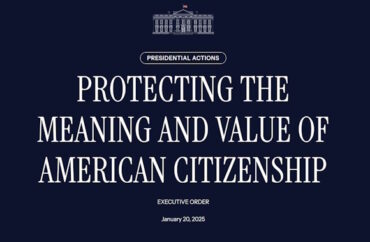
President Donald Trump on Monday signed an executive order declaring an end to birthright citizenship, prompting some scholars to balk at the effort, arguing it’s unconstitutional and will face major court battles.
Titled “Protecting the Meaning and Value of American Citizenship,” the order argues that “the Fourteenth Amendment has never been interpreted to extend citizenship universally to everyone born within the United States.”
The order states that the “privilege of United States citizenship does not automatically extend to persons born in the United States” if that person’s mother was unlawfully present at the time of birth and the father is not a U.S. citizen or lawful permanent resident. The order also affects children born to those on temporary work or school visas.
“This is blatantly unconstitutional,” wrote George Mason University law Professor Ilya Somin for Reason. “Section 1 of the Amendment grants citizenship to anyone ‘born … in the United States and subject to the jurisdiction thereof.’ There is no exception for children of illegal migrants.”
University of Baltimore Law School Professor Michael Meyerson told WBAL-TV Trump’s interpretation is not only wrong but he does not have the power to make the call.
“The Constitution of the United States says that if you are born on our soil, and you are not the child of an ambassador, you are an American citizen. Simply put, if you are born here, you belong here,” Meyerson told the news station. “That’s been the rule from the 14th Amendment right after the Civil War.”
“Supreme Court confirmed that in the 1890s, so the president wants to issue an order saying, ‘I don’t like this. I want to get, get rid of all these kids born here if their parents weren’t citizens,’ and the president has no power to do that.”
Scholars said they predict the order will quickly be challenged in the courts, and likely will eventually make its way to the Supreme Court. Trump had mulled making the move during his first administration, but never did. He indicated yesterday he expects a battle over this.
“When a reporter asked if the order could be called unconstitutional by a court, Trump responded: ‘Could be. I think we have good grounds, but you could be right. We’ll find out,'” the Washington Post reported, adding White House officials say the administration has the “authority to ban birthright citizenship because unauthorized immigrants are in the country illegally and, therefore, are not ‘subject to the jurisdiction’ of the United States government.”
Hiroshi Motomura, an immigration law professor at UCLA, told the Post: “Yes, they could overturn it, but that would not only overturn precedent but you’d have to effectively change the constitution to something that it was never meant to be. That’s true if you look from an originalist perspective. And it’s true from a policy and democracy point of view. It would just be so far-reaching.”
In 2015, The College Fix reported professors also sparred on the topic.
“[T]ruth be told, the 14th Amendment does not need to be repealed in order to fix the problem of birthright citizenship for the children of illegal immigrants. It just needs to be understood and applied correctly,” argued then-Chapman University law Professor John Eastman at the time.
“…The welcome mat to American citizenship is open to anyone in the world regardless of race or ethnic background, as long as they adhere to the legal rules set out by Congress for immigration to this country,” he wrote for National Review.
And political science Professor Edward Erler of California State University, San Bernardino told NBC News: “In reality, birthright citizenship is incompatible not only with the text of the citizenship clause but, more fundamentally, with the principle of consent — one of the bedrocks of republican government.”
But UC Berkeley law Professor John Yoo wrote at the time: “Section One of the 14th Amendment states: ‘All persons born or naturalized in the United States, and subject to the jurisdiction thereof, are citizens of the United States and of the State wherein they reside.’ The constitutional text flatly states that children born in the U.S. are citizens, without reference to whether their parents are aliens or not.”
MORE: ‘Let Resistance ring’: Professor writes anti-Trump inaugural anthem
IMAGE: WhiteHouse.gov
Like The College Fix on Facebook / Follow us on Twitter






Please join the conversation about our stories on Facebook, Twitter, Instagram, Reddit, MeWe, Rumble, Gab, Minds and Gettr.